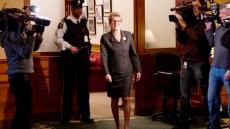TORONTO — Jian Ghomeshi is set to return to court next week for his judgment and as his case resumes, so will the torrent of tweets that drew Canadians into the trial, giving them a full picture of the courtroom — except in the literal sense.
Throughout the former CBC Radio host's sexual assault trial, journalists reported testimony and colour in volume and detail that's rare for a court case.
For some, it raised the question: why, with that level of real-time reporting, are cameras not allowed in most courtrooms?
Canadians can watch as wrestler Hulk Hogan sues the website Gawker over a sex tape and will recall in vivid detail how O.J. Simpson pulled on a leather glove at his murder trial, but for many, the workings of their own court systems remain a mystery.
Policies vary from province to province, with access the most restricted in the larger provinces. But what varies even more widely is the desire for change.
Ontario's Attorney General Madeleine Meilleur didn't beat around the bush when asked if there was any appetite for cameras in courts.
"To tell you the truth, no," she said in a recent interview.
The province ran a pilot project in 2007 with cameras in the Court of Appeal, and though a subsequent report deemed it an overwhelming success, there has been little movement on the issue since. Other provinces such as British Columbia and Saskatchewan have also tested the waters.
Nova Scotia has webcast some appeals and class-action cases when there are media requests.
But the biggest push is coming from Manitoba, where the chief justices have designated courtrooms that are presumptively open to broadcast. The project that began in 2014 focused on cases with a strong public interest and did not include any involving witness testimony, Appeal Court Chief Justice Richard Chartier said.

"We like to proceed on a step-by-step approach in order to provide a certain comfort level," he said.
The pilot project is now on hold, not because of any concerns, but in order to allow for easier media access. Part of the agreement was that the media could use clips from court on newscasts, but the entire proceeding had to be livestreamed somewhere. The satellite costs, however, were proving prohibitive, Chartier said.
Now the court is investigating the possibility of technological upgrades, such as fibre optic cable, to make it more cost-effective for the media.
Most courts don't have the bandwidth or infrastructure to support video broadcasting, and it would be a costly venture, said Ontario Superior Court Justice Fran Kiteley, who is also the co-chair of the Canadian Centre for Court Technology.
If deciding among "improving the service at the counter so that people don't have to stand there three or four hours, or improving the working conditions of the people behind the counter, or having more judges to get the cases to go faster ... as opposed to the fibre optics that you have to do in order to let the public fully in the door — it's not going to be a really challenging decision what you're going to pay for," she said.
The concerns of witnesses are also a significant driver of opposition to cameras in courts.
"Everybody who's involved in a criminal proceeding, be it accused or witnesses, for the most part they don't want to be there and witnesses or victims' families or accused, they all have the choice whether or not to talk to the media," said lawyer Emma Rhodes.
"When you have cameras in the courtroom, you take that choice away."
Rhodes says "there's a million reasons" why she is against cameras in courts, but would be fine with broadcasts from appeal courts, since those proceedings tend to only involve lawyers.
The Manitoba project doesn't involve witness testimony, nor have most of the test cases across the country, and the Supreme Court of Canada has been webcasting proceedings for years. But cameras are still generally not allowed, aside from a few exceptions, in the appeal courts of B.C., Alberta, Saskatchewan, Ontario and Quebec.
Lawyer Sean Robichaud, a staunch cameras-in-courts advocate, believes the hesitation stems from a fear of greater scrutiny.
"Even five years ago, I think there was a lot of reluctance for the same reasons about live tweeting, and every step along the way as technology develops we always see this reluctance for anyone in the justice system to embrace it," he said.
"Primarily it's frustrating to watch, as a lawyer, to hear about people talk about the justice system and there's so little that's actually known about it .... What's often being described to you is a system that isn't ours, it's more indicative of the American justice system."





